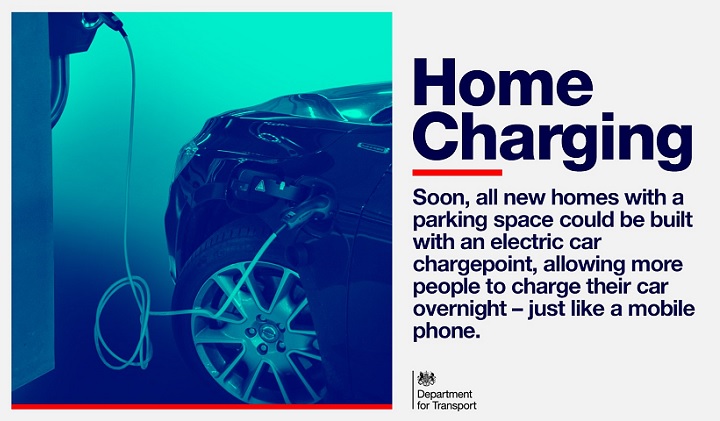
All new-build homes with a dedicated parking space could soon be fitted with an electric car chargepoint, under plans outlined by the Government.
The proposals, described by the DfT as a ‘world first’, aim to support the growing uptake of electric vehicles within the UK by making charging ‘easier, cheaper and more convenient’ for drivers.
They form part of a public consultation on building regulations – and come alongside a package of announcements to support drivers of electric vehicles – including a desire for all newly installed rapid and higher powered chargepoints to provide debit or credit card payment by spring 2020.
The Government says the measures complement wider investment to ensure the UK has one of the best electric vehicle infrastructure networks in the world.
Chris Grayling, transport secretary, said: “With record levels of ultra-low emission vehicles (ULEVs) on our roads, it is clear there is an appetite for cleaner, greener transport.
“Home charging provides the most convenient and low-cost option for consumers – you can simply plug your car in to charge overnight as you would a mobile phone.”
Changes to plug-in car grant putting off prospective buyers?
Two sets of statistics published in recent weeks suggest the demand for ULEVs is beginning to lose momentum.
DfT statistics show that while the number of ULEVs registered for the first time rose by 4% in the first quarter of 2019, this falls below the 20% growth experienced in 2018. Comparing year-on-year stats, there was an 11% growth in Q1 2018.
Meanwhile Society of Motor Manufacturers and Traders (SMMT) figures show that in June, there was a fall in demand for alternatively fuelled vehicles for the first time in 26 months.
These figures could be explained by changes to the Government’s plug-in car grant scheme.
The changes, announced in October 2018, mean the grant for Category 1 vehicles – broadly those that are pure battery electric – has been reduced from £4,500 to £3,500.
In addition, Category 2 and 3 vehicles – mainly plug-in hybrids – are no longer eligible for a grant.
By way of comparison, DfT figures show that 76% of ULEVs registered in 2018 were eligible for a plug-in grant – compared to 43% in Q1 2019.
Comment on this story